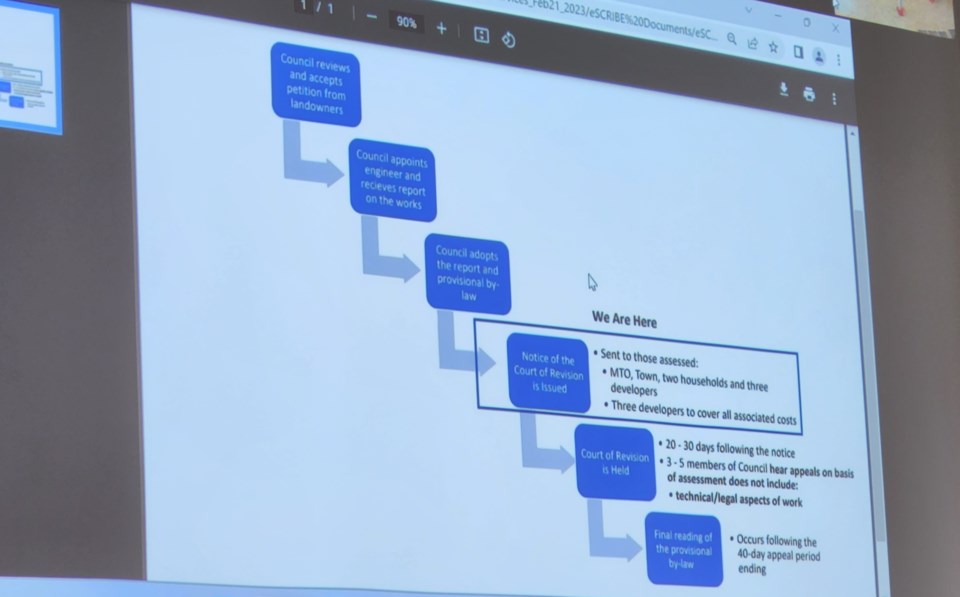The Blue Mountains council, staff and residents spent hours circling the Drainage Act for a discussion on the impact 620 new homes will have on stormwater management in the municipality.
Town officials have been wrestling with the Drainage Act issue now for several months. Three developers in the Craigleith area (Parkbridge Craigleith, McPherson Homefarm and Eden Oak Trailhead) have activated a process in the act to allow them to work together to improve drainage works in their area for their developments to proceed. The three developments have approval for 620 residential units.
“Recognizing the size of these developments and their collective impact on stormwater management in the area, they have initiated a petition under the Drainage Act to make improvements to those watercourses principally impacted by the developments,” Adam Smith, director of planning development services and Brian Worsley, manager of development engineering said in a report.
The proposal is to improve drainage in the area of the three developments with expanded ditching, a diversion channel and upgrades to existing drainage outlets. The goal is to reduce upstream flooding and formalize the current informal spillage during peak flow periods. Full details about the proposed works can be found on page 16 of this report.
The use of the Drainage Act on the matter resulted in objections from members of the community that resulted in council voting unanimously to defer the entire matter until its full council meeting on March 6.
Local residents Bernard Oegema and Alison Kay made a presentation to council and expressed their concerns about the use of the Drainage Act process.
“The Drainage Act intent is for resolution of disputes regarding betterment of the land for areas requiring drainage. There are options that are better for the community and the environment, so the Drainage Act should not be used,” Oegema and Kay said in a letter to council on the issue.
Staff explained that the Drainage Act is provincial legislation that has a particular and prescribed process. The process eventually culminates in a report and provisional bylaw coming to council for approval, which then triggers a notice for a court of revision. The court of revision consists of three to five members of council who hear appeals on the matter. The appeals are limited to what each involved property owner (in this case: the three developers, the town, the Ministry of Transportation and two households) has been “assessed” in terms of financial responsibility for the drainage work. In this case, the three developers have already agreed to pay the costs of all the work.

Appeals based on the technical aspects of the drainage work planned would not be permitted.
Last year, the previous council approved the report on the matter and the first two readings of the provisional bylaw. At the Feb. 21 meeting, staff sought direction from council to allow them to circulate notice of the upcoming court of revision.
However, the recommended resolution from staff on the issue did not receive a mover or seconder and it died on the table. Coun. Shawn McKinlay chaired the meeting (Mayor Andrea Matrosovs was absent to attend a Grey County meeting) and he had to appeal to Clerk Corrina Giles for direction.
When the initial resolution did not reach the table, McKinlay asked if council wanted to split it into two parts. However, he received no response.
“I need some communication here, rather than silence,” said McKinlay.
McKinlay and Giles eventually formulated a resolution to defer the report.
During the course of the debate and discussion, members of council repeatedly expressed dissatisfaction with the lack of public consultation on the matter. There is no requirement in the Drainage Act for a public meeting or conversation on the issue and a site meeting held in June 2022 was the only general engagement with the community.
“Council was not informed of the limitations of the Drainage Act. How is it possible we only hear about this issue now?” questioned Coun. Paula Hope.
Members of staff admitted that the limited public consultation on the matter was not what they would have liked.
“The Drainage Act is more of a technocratic type of exercise,” said Smith.
While Worsley added: “The drainage act is not something that provides for the degree of public input we’re used to or would like.”
Coun. Gail Ardiel was critical of the process.
“It is so convoluted,” she said of the legislation. “Being a farmer, I sometimes shake my head at this Drainage Act.”
Coun. Alex Maxwell asked what legal ramifications the town faced if council chose not to direct staff to set up the court of revision meeting.
Smith said there is an appeal process in place through the Ministry of Agriculture, Food and Rural Affairs.
“It’s hard to speculate. It’s unclear to paint a complete legal portrait based, I think, on my expertise,” said Smith.
Council ultimately voted 5-0 (Matrosovs and deputy mayor Peter Bordignon were absent) to defer the matter.



